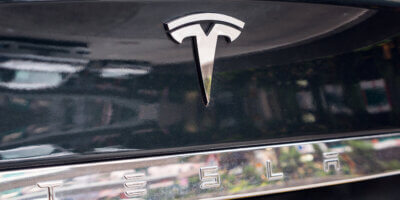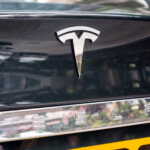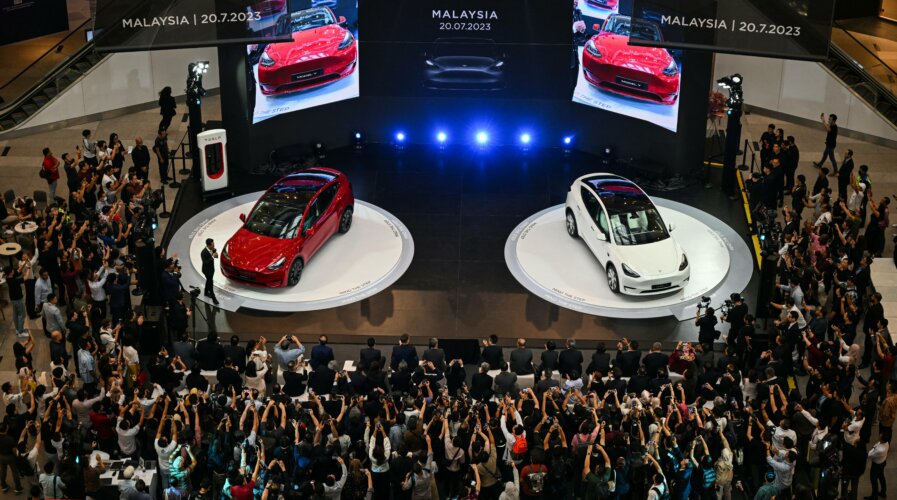
The Tesla Model Y unveiled for the first time in Kuala Lumpur on July 20, 2023. (Photo by Mohd RASFAN / AFP)
Is Indonesia worried about Tesla in Malaysia?
|
Getting your Trinity Audio player ready... |
Tesla is finally in Malaysia. But what does this really mean for the electric vehicle (EV) ecosystem in Southeast Asia? Will there be a shift in EV investments to Malaysia now? While some feel Tesla in Malaysia is a good start, the reality is, Malaysia still has a long way to go in EVs. And Indonesia, should be least worried about it as they have the most important ingredient for EV batteries – nickel.
So when the Prime Minister of Malaysia announced that he was meeting with Elon Musk, naturally there was excitement in the country. Many were looking forward to the meeting, with some even stalking Musk’s private jet to see the routes it would be taking to Malaysia.
However, the Prime Minister did not state that it was going to be a virtual meeting. And while many were disappointed with the technology superstar not coming over, there was still some excitement. Following the virtual meeting with the Prime Minister, it was announced that Starlink would make its services officially available in the country.
The Prime Minister also said he discussed Tesla Inc’s investments in Southeast Asia, and Malaysia in particular. Tesla was reported to have plans for investing in the country as well as setting up headquarters in Cyberjaya, which is expected to open in September or October this year.
Tesla has also officially made its vehicles officially available in Malaysia. The carmaker is not only selling vehicles but also setting up charging infrastructure in the country to support the electric vehicle infrastructure.
Musk, who is also Tesla CEO, remains to be a popular figure in Asia. Having recently concluded trips to China and meetings with the Indian Prime Minister, Malaysia seems to be the next destination that he also has an eye on.
China, remains a key ally for Musk, as the country continues to produce Teslas and is its biggest production hub. India on the other hand, represents an upcoming market, whereby Musk has a cult following and superstar status, even though import duties have kept his vehicles at bay.
However, in a recent meeting with Indian Prime Minister Narendra Modi in New York, Musk said that the company is looking to invest in India “as soon as humanly possible.”
“I am confident that Tesla will be in India and will do so as soon as humanly possible,” he said, without specifying a timeline. Musk said he tentatively plans to visit India next year.
According to a report by CNN, Musk’s push into the Indian market has been in the works for a long time. Back in 2017, the CEO said that Tesla was planning to sell cars in India as soon as that summer.
During the whirlwind trip to China, Musk met with the country’s foreign, commerce and industry ministers as well as senior business figures. A report by NBC stated that though Musk made limited public comments and details of the meetings remained largely private, the foreign ministry quoted him as describing the U.S. and Chinese economies as “conjoined twins” and saying that he was opposed to moves that might undo that.
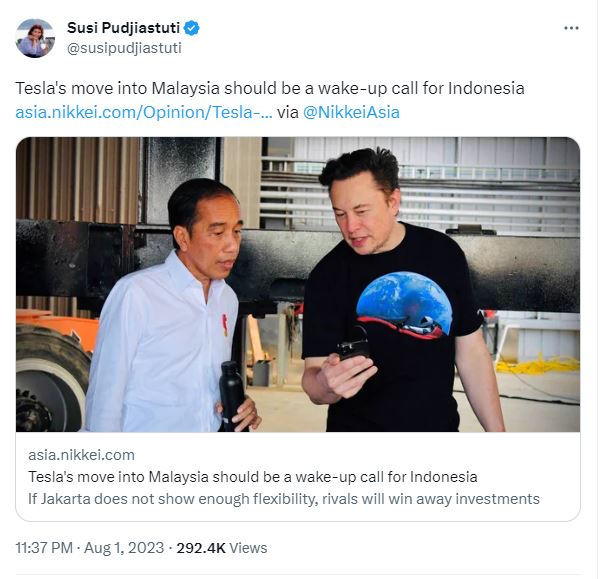
A Tweet on Indonesia being worried about Tesla in Malaysia
Tesla: Malaysia vs Indonesia
While Musk’s popularity in India and China has been positive for both countries, his recent announcements in Malaysia have caused some concern for neighboring Indonesia. Indonesia, which is also one of the world’s largest EV battery producers, also remains on the agenda of Musk, after he met with their President last year to discuss potential investment in the country.
Despite the concern by some Indonesians that Musk may be changing his focus to Malaysia, Indonesia’s officials have been reassuring the public that the country is not being overlooked by the billionaire.
In a news report by South China Morning Post (SCMP), the republic’s maritime affairs and investment ministry had said that it was “not too worried” about Tesla’s investment in Malaysia as it was for sales and distribution, instead of a manufacturing hub.
“Tesla’s investment in Malaysia is not (in the form of) an electric vehicle (EV) factory, but for sales and distribution, so we’re not too worried about that,” Septian Hario Seto, deputy for investment and mining coordination at the ministry, said recently.
“What we are targeting are EV factories. For Malaysia, it only invests in distribution and charging networks.”
Reports show that last year, Indonesia’s coordinating minister of maritime affairs and investment Luhut Pandjaitan claimed Tesla had agreed to buy US$5 billion of Indonesian nickel produced by China’s Zhejiang Huayou Cobalt and CNGR Advanced Material. However, Tesla had never commented on this claim.
Lower prices lead to more car sales
Tesla announced a notable increase in second-quarter profits, attributing this growth to a series of price reductions that led to a substantial rise in car sales. The EV company recorded profits of US$2.7 billion, marking a 20% surge compared to the previous year.
Revenues also experienced a significant surge, rising by 47% to reach a record-breaking US$24.9 billion. This boost was fueled by an 83% spike in auto deliveries, totaling 466,140 vehicles. The company attributed this to more efficient operations at their newer plants in Berlin and Texas.
In February this year, Tesla announced plans to drastically expand its factory near Berlin, to double production capacity at its only European plant to a million electric vehicles per year. In a statement, Tesla said it wants to double its “production capacity to 1,000,000 vehicles” annually. It also plans to ramp up battery storage production capacity at the Gruenheide gigafactory from 50-gigawatt hours annually to “100 gigawatt hours”.
As well as enlarging the existing facilities, the proposals would require the construction of a new production hall. The number of employees could rise from around 10,000 currently “to possibly 22,500,” Tesla said.
During the second quarter earnings press conference, Musk also acknowledged the current “turbulent” macroeconomic environment, highlighting the impact of high-interest rates on consumers. He humorously remarked that global economic conditions can shift dramatically from day to day.
However, company executives pointed out a general alleviation of pressures on essential commodities, including aluminum and steel, as well as crucial battery components such as nickel, cobalt, graphite, and lithium, which is where Indonesia comes in.
EV manufacturing in Indonesia
As Indonesia looks to take some solace that Musk may eventually start manufacturing EVs in the country, it may just go down to demand for Teslas. While Teslas are still one of the best-selling EVs in the world, Chinese EV makers are also becoming increasingly popular.
While Malaysia may get a Tesla hub, reports indicate that Indonesia holds the world’s largest nickel reserves with an estimated 21 million tons, which roughly accounts for 22% of known global reserves. This is what Musk really needs.
More than a dozen nickel ore smelters in Indonesia process the mined nickel. Chinese investors are behind many of the mines and smelters. Among Chinese investments, ventures by the Tsingshan Group are the largest, in part because as the world’s leading stainless steel producer, it must have access to a steady supply of nickel.
Nickel is essential for making the lithium-ion batteries used in EVs. China is the world’s largest EV battery producer. So it only makes sense for the country to get more Chinese EV manufacturers to invest in the country. And that’s exactly what their President did during his recent trip to China.
Indonesian President Joko Widowo wants to position Indonesia as a global hub in the EV production ecosystem. He and the Indonesian Chamber of Commerce met with Chinese CEOs in Chengdu recently as part of the effort to create a downstream nickel industry. The Indonesians’ goal is to attract Chinese mining companies to establish more smelters for nickel ore.
Currently, Hyundai Motor Group (HMG) and LG Energy Solution (LGES) have signed a cooperation in the construction of an electric car battery factory in Indonesia in June 2022. The cooperation agreement with the two large South Korean companies became the first electric vehicle battery investment in Indonesia. Its electric vehicle battery factory will start operating in the first half of 2024.
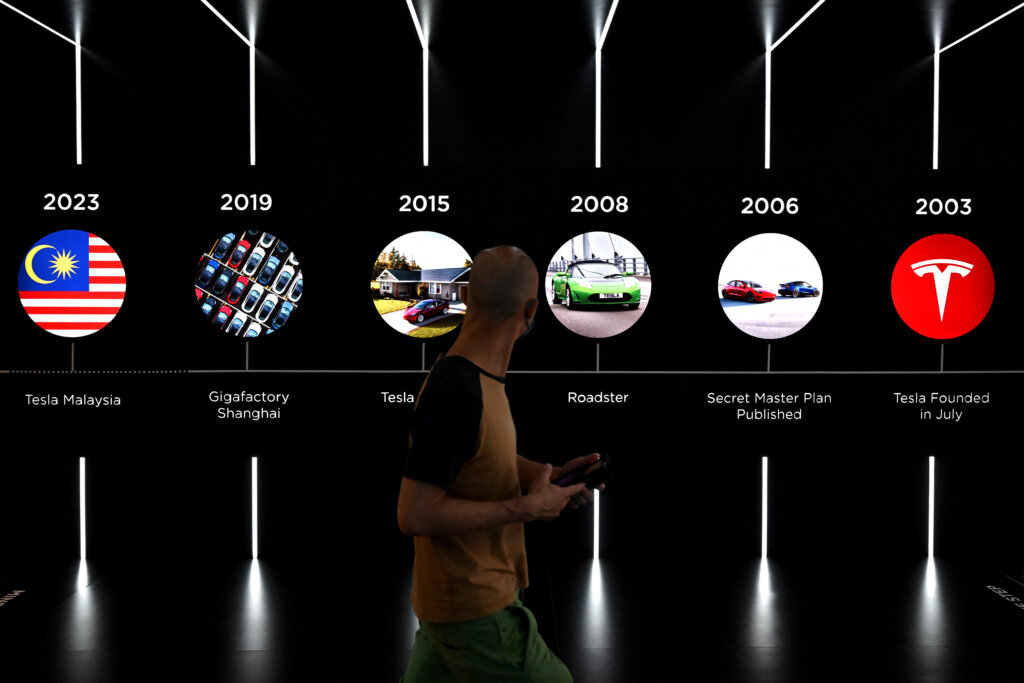
A man walks in front of Tesla banners during the auto firm’s unveiling for the first time in Kuala Lumpur. (Photo by Mohd RASFAN / AFP)
Tesla in Malaysia
For Malaysia, the entry of Tesla into the EV market as well as Musk’s plans to set up a hub in the country are positive signs of the nation’s EV plans. Malaysia is still early in its EV adoption with only a handful of EV manufacturers available in the country.
However, this number is increasing fast. On charging stations, carmakers, energy and fuel companies are already working round the clock to install more charges across the country. Unfortunately, recent statistics show that apart from the capital and some major cities, EV charging infrastructures are still lacking in most parts of the country.
As Musk prepares for his showdown with Mark Zuckerberg, it may not be the same case for Malaysia and Indonesia. EV adoption in both countries is moving at their own pace. In fact, Thailand is actually seeing the most EV sales in the region, while EVs are already a common sight in Singapore.
For now, both Malaysia and Indonesia would probably just have to focus on improving the EV infrastructure and focus on attracting investments from other EV manufacturers as well.
READ MORE
- Safer Automation: How Sophic and Firmus Succeeded in Malaysia with MDEC’s Support
- Privilege granted, not gained: Intelligent authorization for enhanced infrastructure productivity
- Low-Code produces the Proof-of-Possibilities
- New Wearables Enable Staff to Work Faster and Safer
- Experts weigh in on Oracle’s departure from adland

